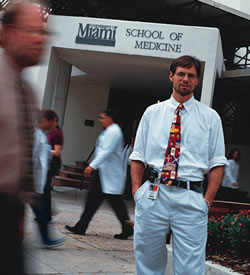![]() n
the summer of 1952, in the midst of a polio epidemic, 25 men and three
women prepared to study medicine at the newly created University of Miami
School of Medicine. These students must have wondered what their role
would be in fighting the annual summer epidemics. Would they join physicians
and families in watching with horror as patients who started with a flu-like
illness later faced paralysis and death?
n
the summer of 1952, in the midst of a polio epidemic, 25 men and three
women prepared to study medicine at the newly created University of Miami
School of Medicine. These students must have wondered what their role
would be in fighting the annual summer epidemics. Would they join physicians
and families in watching with horror as patients who started with a flu-like
illness later faced paralysis and death?
 Before
the Class of 1956 graduated, though, the Salk and Sabin vaccines brought
hope that physicians could prevent polio. When the polio epidemic disappeared
during the next decade, it was widely viewed as a victory for biomedical
research. The vaccines stood as proof that miracles were possible when
science, government funding, and community effort joined forces against
disease.
Before
the Class of 1956 graduated, though, the Salk and Sabin vaccines brought
hope that physicians could prevent polio. When the polio epidemic disappeared
during the next decade, it was widely viewed as a victory for biomedical
research. The vaccines stood as proof that miracles were possible when
science, government funding, and community effort joined forces against
disease.
It is awesome to observe the many other changes
in medicine since the school’s founding. Penicillin was just becoming
widely available as a “wonder drug” that would change medical
practice. In 1953 Watson and Crick announced a revolutionary theory: DNA
was structured in a double helix that could replicate itself. The first
human kidney transplants in 1955 were daring experiments, not today’s
standard of care. Diseases like cancer and conditions like mental retardation
were sources of shame for families, hidden from public view. In the 1950s
the average life expectancy in the United States was 62 years (today it’s
78), and pneumonia and tuberculosis were being replaced by cancer and
heart disease as the leading causes of death for adults.

Where do we stand today, facing the next 50 years of medicine? Success,
it seems, brings high expectations but no respite from fear of failure.
Vaccines may have nearly eliminated measles, polio, and rubella in the
United States, but routine childhood immunizations such as DTaP are in
short supply as our nation faces irrational fears and inadequate resource
allocation. The success of antibiotics has brought their overuse, leading
to new strains of resistant bacteria. Information from the human genome
project promises new therapies and deeper understanding of disease and
behavior, but such potential brings nearly as much fear as hope for the
future. Transplants of human organs proliferate but raise thorny ethical
questions for medical centers that perform them. AIDS has, for some, replaced
cancer as the disease of shame. Despite longer life expectancy in the
United States, we despair at the shorter average life span for African-Americans.
Celebrating anniversaries such as the School of Medicine’s provides an opportunity to look back, acknowledge our failures, and more importantly, take pride in our accomplishments. We can view our current anxieties about the state of medicine through a historical lens: the past 50 years have launched an unprecedented advance in biomedical science that has improved health and well-being. We have much to celebrate.
Even more lasting than the research revolution, we hope, will be the changes in the human aspects of medicine. Gone are the days of paternalism, when physicians dictated treatment and withheld information from patients and families. Gone, too, is the single face of medicine as a white male profession. The Class of 2006 reflects our community’s ethnic diversity in a way that our school’s founders never imagined. Whatever the next challenges in health care may be, we will face them as a profession grounded in biomedical science and more closely aligned with our patients and community than ever before.
UM MEDICINE HOME | UM MEDICINE ARCHIVE